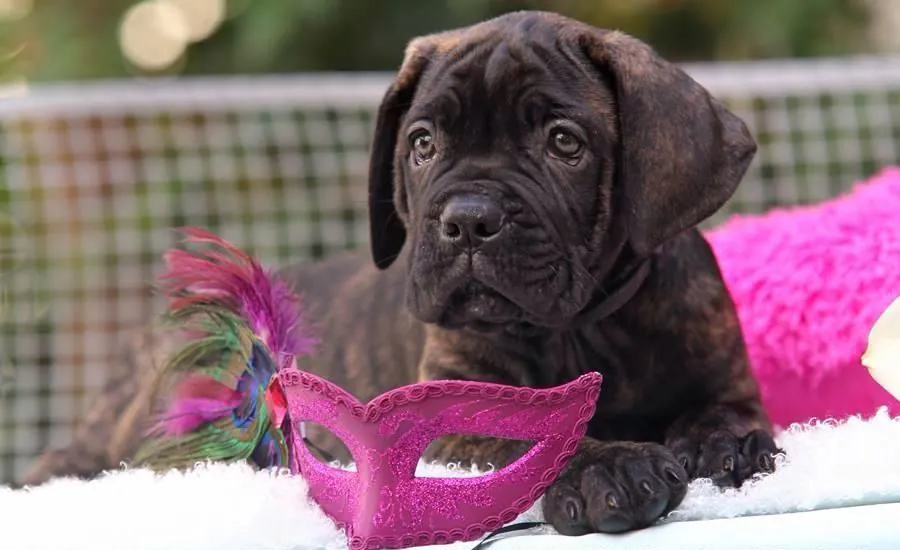Don't miss our holiday offer - up to 50% OFF!
Caring for Cane Corso Puppies: Training, Socialization, and Health Tips for Loyal Family Pets
Raising Cane Corso puppies is a fulfilling experience that requires dedication, patience, and the right knowledge. These powerful yet affectionate dogs are admired for their loyalty, intelligence, and protective instincts, making them excellent family pets when cared for properly. To ensure your Cane Corso puppy matures into a balanced and well-behaved companion, it is essential to focus on three core areas: puppy training, socialization, and health care. Each of these plays a crucial role in shaping their behavior, confidence, and overall well-being.
By following structured puppy training, providing consistent socialization, and prioritizing health tips tailored to the Cane Corso breed, you can create the foundation for a strong, lifelong bond with your dog.

1. Puppy Training: Building Discipline and Obedience from the Start
Puppy training is the cornerstone of raising Cane Corso puppies into disciplined and manageable adult dogs. Known for their intelligence and eagerness to please, Cane Corsos respond well to consistent, structured training methods. Start with basic obedience commands such as sit, stay, come, and heel. These commands establish authority while also making daily interactions easier and safer. Because of their size and strength, it is critical to instill good habits early before bad behaviors become difficult to manage.
Positive reinforcement is the most effective approach for Cane Corso puppies. Rewarding good behavior with praise, treats, or play encourages learning while strengthening your bond. Avoid harsh punishments, as this breed thrives on trust and respect. Training sessions should be short but consistent, focusing on patience and repetition. Advanced training, such as leash control and protective behavior management, can follow once your puppy masters the basics.
Effective puppy training not only ensures good behavior but also fosters a sense of trust, making your Cane Corso a reliable and loyal family pet for years to come. For additional guidance, you can consult expert puppy training resources.
2. Socialization: Developing Confidence and Reducing Anxiety
Socialization is just as vital as obedience training when raising Cane Corso puppies. This powerful breed can sometimes become overly protective or shy if not exposed to a variety of environments, people, and animals during its early developmental stages. To prevent this, structured socialization should begin as soon as your puppy receives its initial vaccinations.
Introduce your Cane Corso to different settings—parks, streets, car rides, and public spaces—so they learn to adapt to changing environments. Encourage safe and positive interactions with children, adults, and other pets to build confidence and reduce anxiety in unfamiliar situations. Supervised play with other dogs is particularly beneficial, teaching your puppy healthy communication and boundaries.
Socialization also helps curb unwanted behaviors such as excessive barking, fear-based aggression, or nervousness around strangers. By exposing your Cane Corso to new experiences early, you are shaping a balanced temperament that will last into adulthood. Confident and well-socialized Cane Corso puppies grow into family pets that are not only protective but also calm, approachable, and trustworthy. For expert advice on socialization, see trusted puppy socialization resources.

3. Health Tips: Ensuring Long-Term Wellness and Vitality
Maintaining the health of Cane Corso puppies should be a top priority for every responsible owner. This breed is prone to certain health concerns, such as hip dysplasia, bloat, and joint issues, which require proactive care and monitoring. Scheduling regular veterinary check-ups is essential to track your puppy’s growth, administer vaccinations, and catch potential problems early.
A balanced, nutrient-rich diet is another critical factor in supporting your Cane Corso’s development. Choose high-quality puppy food formulated for large breeds, as it promotes healthy bone and muscle growth. Avoid overfeeding, as excess weight can strain developing joints. Fresh water, portion control, and feeding consistency should always be part of your puppy’s routine.
Exercise also plays a key role in maintaining wellness. Short, gentle walks and controlled play sessions are ideal for young puppies, while more rigorous activity can be introduced as they grow. Regular grooming, dental care, and parasite prevention further contribute to long-term health.
By following these health tips and committing to preventive care, you ensure your Cane Corso puppy enjoys a strong, energetic, and fulfilling life as a loyal family pet. For additional health guidance, check out Cane Corso breed health tips and large breed puppy nutrition advice.

Conclusion
Caring for Cane Corso puppies is a rewarding journey that requires commitment, patience, and the right approach. By focusing on structured puppy training, consistent socialization, and proactive health care, you will shape your Cane Corso into a confident, loyal, and loving family pet. This majestic breed thrives under guidance and routine, and the time you invest in their development will pay off with a lifetime of protection, companionship, and unconditional love.
Frequently Asked Questions (FAQ) About Cane Corso Puppies
1. Are Cane Corso puppies good family pets?
Yes, Cane Corso puppies make excellent family pets when properly trained and socialized. They are loyal, protective, and affectionate with their families.
2. How important is puppy training for Cane Corsos?
Puppy training is essential due to their size and strength. Early obedience training ensures discipline, safety, and better long-term behavior.
3. When should I start socializing my Cane Corso puppy?
Begin socialization after the first round of vaccinations, usually around 8–10 weeks. The earlier you start, the better their adaptability and confidence.
4. What are the most important health tips for Cane Corso puppies?
Regular vet visits, a balanced diet, controlled exercise, parasite prevention, and joint health monitoring are crucial for long-term wellness.
5. How much exercise does a Cane Corso puppy need?
Young puppies need short, gentle walks and play sessions. As they grow, gradually increase activity to maintain strength and prevent boredom.
